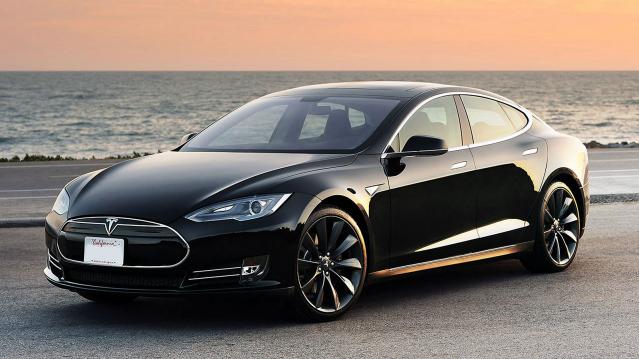A Red-Hot Tesla Burns Rubber on Consumer Reports

The Tesla Model S P85D sedan just broke the Consumer Reports rating system.
By definition, a car can’t exceed a score of 100 on the road test. But after the P85D racked up a score of 103, Consumer Reports was forced to create a new benchmark for the system and overhaul the ratings process according to a news release. The new system caused the car to slip to a score of 100.
A few characteristics of the car that allowed it to perform better in the test than any other car ever before include its rapid acceleration ability (0 to 60 mph in 3.5 seconds), its remarkable energy-efficiency (the car gets the equivalent of 87 miles per gallon) and its better breaking and handling system than the former top-scoring standard Model S. Two years ago, the base model version of the Model S received a 99 out of 100, which at the time was the highest rating ever for a vehicle.
Related: Why Americans Are Keeping Their Cars Longer Than Ever
The report is careful to note that even with a perfect score, the Tesla isn’t a perfect car. Besides a price tag of $127,820, beyond the means of the average person and the most expensive car Consumer Reports has ever reviewed, the car is louder than the base Model S and isn’t as plush as other luxury vehicles.
In addition, a long drive might be problematic if there aren’t any nearby charging stations along the route due to the vehicle’s 200-plus mile range. The rating also doesn’t account for the Tesla’s reliability, but the Model S comes with average reliability, according to owner-survey responses.
Imperfections aside, the car received an enviable final assessment. “It’s a remarkable car that paves a new, unorthodox course, and it’s a powerful statement of American startup ingenuity,” the report reads.
Deficit Hits $738.6 Billion in First 8 Months of Fiscal Year

The U.S. budget deficit grew to $738.6 billion in the first eight months of the current fiscal year – an increase of $206 billion, or 38.8%, over the deficit recorded during the same period a year earlier. Bloomberg’s Sarah McGregor notes that the big increase occurred despite a jump in tariff revenues, which have nearly doubled to $44.9 billion so far this fiscal year. But that increase, which contributed to an overall increase in revenues of 2.3%, was not enough to make up for the reduced revenues from the Republican tax cuts and a 9.3% increase in government spending.
Tweet of the Day: Revenues or Spending?

Rep. Kevin Brady (R-TX), ranking member of the House Ways and Means Committee and one of the authors of the 2017 Republican tax overhaul, told The Washington Post’s Heather Long Tuesday that the budget deficit is driven by excess spending, not a shortfall in revenues in the wake of the tax cuts. The Wall Street Journal’s Kate Davidson provided some inconvenient facts for Brady’s claim in a tweet, pointing out that government revenues as a share of GDP have fallen significantly since 2015, while spending has remained more or less constant.
Chart of the Day: The Decline in IRS Audits

Reviewing the recent annual report on tax statistics from the IRS, Robert Weinberger of the Tax Policy Center says it “tells a story of shrinking staff, fewer audits, and less customer service.” The agency had 22% fewer personnel in 2018 than it did in 2010, and its enforcement budget has fallen by nearly $1 billion, Weinberger writes. One obvious effect of the budget cuts has been a sharp reduction in the number of audits the agency has performed annually, which you can see in the chart below.
Number of the Day: $102 Million

President Trump’s golf playing has cost taxpayers $102 million in extra travel and security expenses, according to an analysis by the left-leaning HuffPost news site.
“The $102 million total to date spent on Trump’s presidential golfing represents 255 times the annual presidential salary he volunteered not to take. It is more than three times the cost of special counsel Robert Mueller’s investigation that Trump continually complains about. It would fund for six years the Special Olympics program that Trump’s proposed budget had originally cut to save money,” HuffPost’s S.V. Date writes.
Date says the White House did not respond to HuffPost’s requests for comment.
Americans See Tax-Paying as a Duty

The IRS may not be conducting audits like it used to, but according to the agency’s Data Book for 2018, most Americans still believe it’s not acceptable to cheat on your taxes. About 67% of respondents to an IRS opinion survey “completely agree” that it’s a civic duty to pay “a fair share of taxes,” and another 26% “mostly agree,” bringing the total in agreement to over 90%. Accounting Today says that attitude has been pretty consistent over the last decade.



